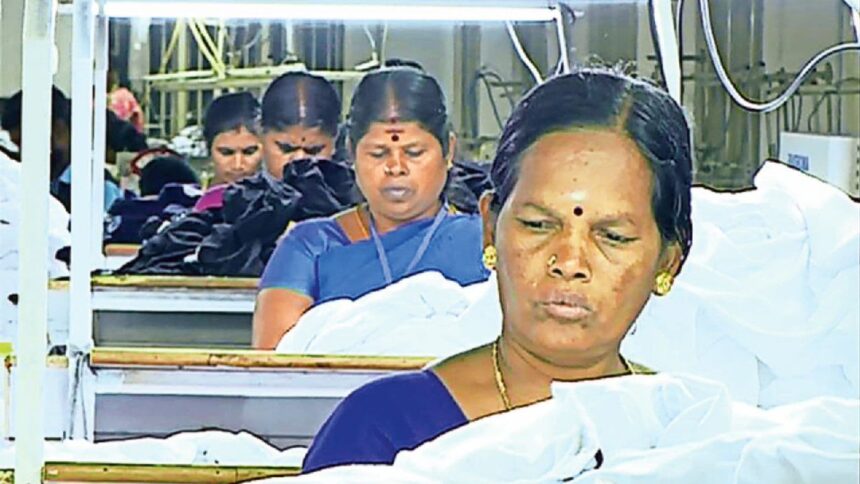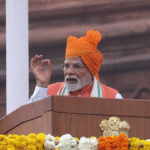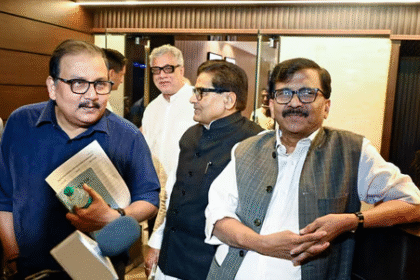Indian Knitwear Hub Tiruppur Faces Uncertainty as Trump’s 50% Tariffs Hit Exports
Chennai: Often referred to as the ‘Knitwear Capital of India’, Tiruppur, one of the western districts of Tamil Nadu, is an important trade centre for India’s textile business. Tiruppur’s knitwear industry, which provides direct and indirect employment to over 10 lakh people, holds a 90% share in India’s total cotton knitwear exports and 55% share in India’s total knitwear exports.
In the financial year 2023-2024, Tiruppur’s export value was Rs 30,690 crore; in 2024-2025, this went up to Rs 39,618 crore. When the Donald Trump administration announced a baseline 10% tariff on India while levying 19% and 20% tariffs on India’s competitor countries in knitwear exports such as Bangladesh, Pakistan, Vietnam and others, various American buyers brought significantly more business to Tiruppur. However, the situation is set to reverse.
On July 31, the US government imposed a “reciprocal” tariff of 25% on most goods exported from India, starting from August 7. Further, an additional “penalty” rate of 25% – bringing the total to 50% – with effect from August 27, was imposed on August 6. This 50% tax has already started to impact Tiruppur’s export business even before the date of effect.
“We were hopeful that next year’s business would increase by up to 20% compared to the current year. But due to Trump’s new tariff policy, we cannot reach the expected target if the situation continues for the next two months because 30% of the exports are to the US. This has caused a major impact on our exports. American companies have asked us to halt some already-taken orders. New orders are also not being placed,” says Kumar Duraiswamy, joint secretary of the Tiruppur Exporters’ Association (TEA).
“If the government helps, we can definitely face this challenging period with some difficulty,” says M.P. Muthurathinam, president of the Tirupur Exporters and Manufacturers Association (TEAMA). “The American market is somewhat different from other countries. We export goods to them at lower prices. The margin is only 5%. However, we export goods to other countries like Europe at a 20% margin. But orders from the US are bulk, while orders from other countries, including Europe, though at higher prices, are only in smaller quantities.”
Muthurathinam says that with the government’s help, the American market can be replaced by expanding the Indian market to other countries. “India has signed FTAs with countries including the UK and Dubai, and is in negotiations with 17 more countries. If this is expedited, we can recover from the impact caused by Trump’s tariffs,” he says.
“Some buyers have stopped giving orders to us. Some say they will pick up the orders when the situation comes back to normal. But we cannot afford to wait because every month we need to pay the salaries to employees and repay the loans to the banks,” said Varadharaj, managing director of the knitwear manufacturing, processing and export company Trinity Tex located on Mangalam Road, Tiruppur.
Already produced garments cannot be sold to different buyers because the copyrights of the designs are with the US buyers. “As per the agreement we have with our US buyers, they hold the legal license and ownership for the style and design of the material. We just cannot simply sell them to a different buyer. We may have to face legal consequences if we do so,” explains Varadharaj.
The impact of Trump’s tariffs is soon going to result in loss of employment in Tiruppur. “The immediate threat is reduction of shifts in production. If the situation continues for another six months, so many employees will lose their jobs,” says Duraiswamy.
When replying to a question in the Lok Sabha, Union minister of state for finance Pankaj Chaudhary said the Department of Commerce is engaging with all stakeholders including exporters and industry for taking feedback of their assessment of the situation. “It is estimated that around 55% of total value of India’s merchandise exports to the US will be subject to this reciprocal tariff,” he said.
Tiruppur has always shown resilience in the face of crises. When COVID-19 affected the industry, the city quickly reacted to the pandemic and became the country’s biggest manufacturing hub for face masks, gloves and personal protective equipment kits. Exporters hope that this time too, they will be able to find a way out of the crisis that looms large.
Also Read: Closing Arguments Begin in Jimmy Lai’s National Security Trial Amid Legal and International Scrutiny








